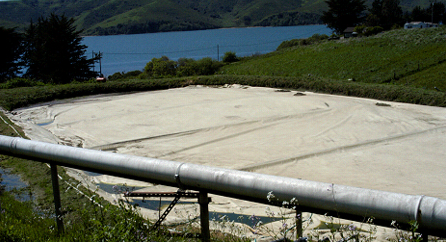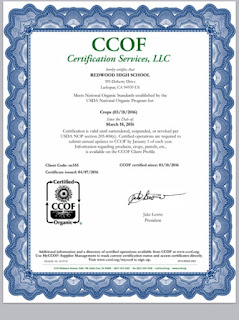This week was our first week of breaking into our final projects.
Kylie and I are planning on creating lip balm, soap, and candles from beeswax and other natural oils and materials. We started by collecting the materials we needed which include beeswax, coconut oil, vitamin E oil, almond oil, and other essential oils. This week we experimented with lip balm, it is actually a simple project for anyone that wants to try to create all natural lip balm, what we did was grated one part beeswax, two parts coconut oil, with a few drops of vitamin E oil for a moisturizing effect. We melted it together and stirred until we had a clear oil like liquid, we poured small amounts into containers we bought off of amazon and let it cool. It was our first time trying it so we need some more practice, but it turned out pretty well!
We are excited to see how the rest of our products will work out, we plan to sell our products at the last market day.
Thursday, April 28, 2016
Wednesday, April 27, 2016
Organic Certification
Recently we received word from CCOF that our farm passed their inspection is USDA Organic. I began this process in September of last year and after filling out the application we were inspected by CCOF. Soon after the inspection we were told that we passed and that we are certified.
Since the beginning of the RHS farm we have used 'organic' methods but now we are able to officially market that produce that comes from our farm is certified organic. I am very pleased that I was able to contribute to the farm becoming organically certified. I encourage future students to contribute in continuing to follow our standards of farming sustainably and organic methods. I hope you participate in future inspections and certification renewal.
Miles
Friday, April 8, 2016
SustAg Action
It was a an action packed week for Mr. Stewart's SustAg classes (a couple of weeks ago)! Students gave their presentations on their farm reports, where they ventured to farms and farmers markets for interview farmers and representatives.Later in the week, the class went out to the marsh for a lesson on bees. And to finish up the week, the class held its monthly market. With its wide array of permaculture up for purchase, the market was a success.
--Ray
Week in Review
The spring is upon us; the temperature is rising and the days are becoming longer and hotter. This week in SustAg, many groups are planting new crops for the spring rotation and harvesting the old ones. In loom of spring break, students have been preparing their beds for the upcoming week. By now, the places that were harvested are now filled with new spring crops: either seeds that were planted, or crops that were grown in the hoop house in flats. In addition to our one bed work, we have also had a lot of time to work at our management jobs. My groups management job is composting, so we spent our block period this week building the March compost pile and sifting through the October/November pile. Overall, it was an important and productive week with lots to be done before break. I am excited to see the results after one week away from the farm.
Wednesday, April 6, 2016
Recently in Sustainable Agriculture
Recently in Sustainable Agriculture, we've been doing a lot of cleaning and maintenance work around the farm to make sure it looks good for the springtime. Last week, my group and I did a complete cleanup of our bed, getting rid of all of the invasive weeds and the one bell bean plant we've had since August. As of today, we planted some sweet peppers in our bed which is exciting, although I was hoping for watermelons.
Last week we helped John out by completely double digging one of the class beds, adding in new compost, and then broadcasting onions, lettuce, and mustard throughout it.It's been a fun time on the farm recently, and I'm excited to see our plants flourish with the beautiful weather to come!
Marisa
Monday, March 21, 2016
Straus Family Creamery
This week in sustainable agriculture a speaker from Straus Family Creamery joined us named Alex Fox. She is a Redwood graduate who went on to major in environmental studies at UC Santa Cruz. She also has a master in Green Business. After interning at multiple different places, she was hired by Straus Creamery where she is now the sustainability manager.

Straus Creamery is the 1st certified organic dairy farm. They have a total of 8 farms that provide them milk. The company thrives off its four core values of: sustainability, innovation, integrity, and respect. Straus makes many efforts to reduce its ecological footprint. Ms. Fox mentioned a few of the steps such as: Annual sustainability reports and waste audits, methane digester, reusable glass bottles, electric vehicle fleets, and joining the Marin Carbon Project. The Methane Digester was one of the practices that intrigued me the most. The digester takes manure that is washed off of the barn floors into an anaerobic environment where bacteria is able to digest the methane and produce a solid that can be used to fertilize the fields, and creates electricity that the farm can use. This reduces their methane and electricity usage massively. The Marin Carbon Project is another way that the company is able to help reverse the effects that the farms may be having on the environment. Straus has created a 20 year carbon farming plan. This plan helps answer the question of "how can we take carbon dioxide out of the atmosphere and get it back into the ground." It includes adding ½ an inch of compost to the the soil which removes one ton of compost per acre for 30 years. It seems like such a simple addition that actually makes a world of the difference.

I would really like to thank Alex Fox for taking time to share with us her story and the ways in which Straus Family Creamery is making a difference help lead the way to a sustainable future. (Pictures are courtesy of the Straus Family Creamery website.)
Straus Creamery is the 1st certified organic dairy farm. They have a total of 8 farms that provide them milk. The company thrives off its four core values of: sustainability, innovation, integrity, and respect. Straus makes many efforts to reduce its ecological footprint. Ms. Fox mentioned a few of the steps such as: Annual sustainability reports and waste audits, methane digester, reusable glass bottles, electric vehicle fleets, and joining the Marin Carbon Project. The Methane Digester was one of the practices that intrigued me the most. The digester takes manure that is washed off of the barn floors into an anaerobic environment where bacteria is able to digest the methane and produce a solid that can be used to fertilize the fields, and creates electricity that the farm can use. This reduces their methane and electricity usage massively. The Marin Carbon Project is another way that the company is able to help reverse the effects that the farms may be having on the environment. Straus has created a 20 year carbon farming plan. This plan helps answer the question of "how can we take carbon dioxide out of the atmosphere and get it back into the ground." It includes adding ½ an inch of compost to the the soil which removes one ton of compost per acre for 30 years. It seems like such a simple addition that actually makes a world of the difference.
I would really like to thank Alex Fox for taking time to share with us her story and the ways in which Straus Family Creamery is making a difference help lead the way to a sustainable future. (Pictures are courtesy of the Straus Family Creamery website.)
Thursday, March 17, 2016
Local Farms
This week in Sust Ag, a lot of things have been happening. In the past two days, we have had two guest speakers from a variety of different sustainability backgrounds. Alex Fox, who is the Sustainability at Straus Farms, discussed thoroughly about her experiences in the food world, especially about how Strauss farms works to mitigate climate change. At their farm, for example, they use a "Methane Digester", which is a tarp that suppresses methane from being put into the atmosphere and manages to turn that into electricity. Since Dairy farms are big emitters of methane, it make sense to use these type of devices to stop climate change. Unfortunately, methane digesters are expensive and difficult to maintain, which is why they are not being used as widespread across California.
Sarah, a former Redwood student as well as Alex, works as an herbalist to use products from the natural world for medicinal purposes. She talked about using Aloe Vera for skin irritation, chewing up Yarrow to make a paste to stop bleeding, and how eating bitter things like Dandelion leaves is "sweet to the stomach", as it improves gut health. These have been the main things we have experienced in class during this week.
However, outside of class, students have been working on their Farm reports by going to visit local Marin County farms or visiting local farmer's markets and interviewing them. For interviews, students have been asking farmers what they plant, when they plant, how they plant, and how much compost do you use among other questions. For students who visited farms, we were able to observe first hand how farms go about planting. Last weekend, my group visited the Green Gulch Farm in Muir Beach where we saw a variety of different plants in smaller beds but noticed that most of their bigger fields had only bell beans planted in them. This was an exciting and interesting experience for both me and my group mates.
Sarah, a former Redwood student as well as Alex, works as an herbalist to use products from the natural world for medicinal purposes. She talked about using Aloe Vera for skin irritation, chewing up Yarrow to make a paste to stop bleeding, and how eating bitter things like Dandelion leaves is "sweet to the stomach", as it improves gut health. These have been the main things we have experienced in class during this week.
However, outside of class, students have been working on their Farm reports by going to visit local Marin County farms or visiting local farmer's markets and interviewing them. For interviews, students have been asking farmers what they plant, when they plant, how they plant, and how much compost do you use among other questions. For students who visited farms, we were able to observe first hand how farms go about planting. Last weekend, my group visited the Green Gulch Farm in Muir Beach where we saw a variety of different plants in smaller beds but noticed that most of their bigger fields had only bell beans planted in them. This was an exciting and interesting experience for both me and my group mates.
JD Mancini
Subscribe to:
Posts (Atom)










